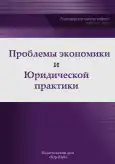Typical Methods of Illegal Logging (Based on Materials from the Russian Federation and Mongolia)
- Authors: Amarsaikhan M.1
-
Affiliations:
- Management Academy of the Ministry of the Interior of Russia
- Issue: Vol 18, No 2 (2022)
- Pages: 129-133
- Section: Articles
- URL: https://bakhtiniada.ru/2541-8025/article/view/147064
- ID: 147064
Cite item
Abstract
The relevance: caused by the significant increase in recent years in Mongolia the number of annually recorded crimes of illegal logging, as well as the increased risk of these crimes. The regulation of nature conservation in both Mongolia and Russia at present and the liability for illegal traffic in illegally logged wood. The purpose: a comparative analysis of the methods of illegal logging in Mongolia and the Russian Federation, as well as an analysis of legal regulation. To develop a proposal for further improvement of the legal regulation of criminal liability for illegal logging in Mongolia. The methods: The methodological basis of the study was the general dialectical method of cognition, contributing to a systematic and diverse examination of the specifics of committing crimes in the field of illegal logging. In addition, in the research process, description methods, generalization, and comparison were used. The conclusion: The author concludes that the typical methods of illegal logging of forest stands in Mongolia and the Russian Federation have great similarities and important forensic significance for the formation of a methodology for investigating crimes of this category. At the same time, the criminal law regulation of liability for illegal timber trade in Mongolia requires improvement and the use of such regulation according to the experience of the Russian Federation.
Full Text
##article.viewOnOriginalSite##About the authors
Manlai Amarsaikhan
Management Academy of the Ministry of the Interior of Russia
Email: amarsaikhanmanlai@gmail.com
Post-graduate of Training of Scientific and Scientific-Pedagogical Personnel, police major Moscow, Russian Federation
References
- Belkin R. S. Criminalistics: problems, trends, prospects. General and private theories. -M.: Yurid. lit., 1987. -302 p.
- Belkov V. A. A method of committing illegal logging of forest plantations as an element of the forensic characteristics of a crime // Legal Science and Law Enforcement Practice. -2018. -No. 3. -рр. 145-155.
- Vasilyeva M.A. Integration issues in solving forensic problems in investigating environmental crimes // Bulletin of the Tomsk State University. Right. -2019. -No. 32. -рр. 19-23.
- Vasilyeva M.A. Forensic problems of investigating the acquisition, storage, transportation, processing for the purpose of selling or selling obviously illegally harvested wood // Proceedings of the Academy of Management of the Ministry of Internal Affairs of Russia. -2018. -No. 1(45). -pp. 100-103.
- Vasilyeva M.A. The initial stage of the investigation of illegal logging of forest plantations (based on the materials of the Far Eastern region of Russia): Abstract of the thesis. … cand. legal Sciences: 12.00.12 -M., 2014. -26 p.
- Munkhdorzh B., Tsolmon B. Statistical possibilities of analyzing the state of crime in Mongolia // Sociology of criminal law and reformation of criminal legislation: collection of articles. mat-lov intl. scientific-practical conf. / resp. ed. E.L. Radnaev. -M.: Publishing house «Jurisprudence», 2018. -рр. 24-31.
- Tymoshenko Yu. A. Responsibility for environmental crimes. Scientific and practical commentary on the decisions of the Plenum of the Supreme Court of the Russian Federation: theory and practice. -M.: Prospekt, 2016. -240 p.
- Fiskov I. A. Criminal liability for the illegal use of forests: dis. … cand. legal Sciences: 12.00.08 -Khabarovsk, 2019. -205 p.
- Churakov D. B. Countering criminal encroachments on the safety of forest and other plantations (criminal and criminological measures): dis. … cand. legal Sciences: 12.00.08 -M., 2017. -268 p.
- .Shashkova V. N., Erbol S. Nomination mechanisms in the articles of the Criminal Code of the Russian Federation, the Criminal Code of Mongolia and the Code of the United States of America dedicated to sentencing // International Scientific Research Journal. -2018.-No. 11. Part 1. -рр. 142-145.
Supplementary files








